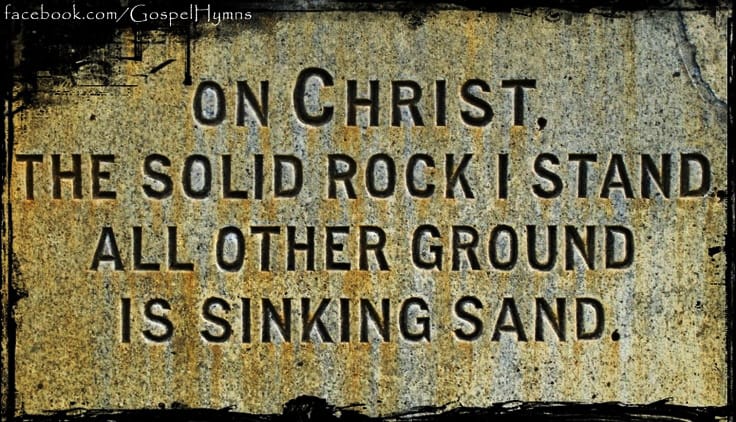“My hope is built on nothing less than Jesus’ blood and righteousness” the firm foundation of male authority?
There is a movement today that calls men to be responsibly involved with their families and in the church. Unfortunately, this movement equates this responsible involvement with “leadership.” Apparently, men will either be leaders, or they will be uninvolved. (For more on this movement read a brief history from Christianity Today or this critique from Relevant magazine.)
But is “leadership” the best way to frame the conversation about men’s participation in the home and in the church?
I don’t think framing male participation in terms of “leadership” is either necessary or helpful. Can a man courageously share responsibility for the well-being of his family, without thinking this means he has authority over his wife? Of course he can. Can a man actively serve God in the church without assuming this means he must exercise authority over women? Of course he can.
So then, is “to lead or not to lead,” really the most important question that faces Christian men today? I don’t think it is. The gospel calls upon all Christians (men and women) to love God with all our heart, soul, mind and strength, and to love our neighbor as we love ourselves. Jesus explained that in following these two commands, we fulfill the entirety of God’s will (Matthew 22:36-40). “To love, or not to love,” I believe that is the important question facing all Christians today, men included.
Restoring men to their “rightful” place?
The Christian male leadership movement also suggests that if men do not “step up” and take their rightful place as leaders in the church and in their homes, our society will fall into chaos. The flip-side of this belief is that women are overstepping their bounds and usurping male authority if they lead anything. As a result, some would say that God’s “created order” has been turned upside-down. In contrast to this androcentric worldview, the Bible tells us that it is not men who need to be restored to their “rightful place” in human society; rather, it is God. (More about androcentrism here.)
Sin, we’re told, has taken all of humanity (men and women) captive, and we are all equally in need of redemption. By faith, Christians share in the death of Jesus Christ. This means that as far as our former master (sin) is concerned, we’re dead. It can no longer lay claim to us; we have been set free: “And do not present your members as instruments of unrighteousness to sin, but present yourselves to God as being alive from the dead, and your members as instruments of righteousness to God. For sin shall not have dominion over you, for you are not under law but under grace” (Romans 6:13-14, NKJV).
Male leadership is not what humanity needs to cure what ails us.
The Bible describes the inclination of men to “rule over” women as a “curse,” a consequence of sin (Genesis 3:14-16). Rather than being the solution, it is a part of the problem. Thankfully, the Bible tells us that Jesus Christ died to free us from sin, the law and its curse: “Christ has redeemed us from the curse of the law, having become a curse for us, for it is written, ‘Cursed is everyone who hangs on a tree’…” (Galatians 3:13, NKJV). As a result of this redemptive work, we are freed from the curse, which includes gender inequality: “There is neither Jew nor Greek, there is neither slave nor free, there is neither male nor female; for you are all one in Christ Jesus” (Galatians 3:28, NKJV).
Instead of insisting that we look to male leadership to save us from our troubles, let us instead say with the apostle Paul, “For I resolved to know nothing while I was with you except Jesus Christ and him crucified” (1 Corinthians 2:2, NIV).
It seems to me that putting our trust in male leadership is a false hope and a poor substitute for the gospel.
“My hope is built on nothing less than Jesus’ blood and righteousness.” (Mote, 1836)
———————————————–
Pick up the Kindle version of Bob’s book Let My People Go: A Call to End the Oppression of Women in the Church.





13 responses to “To Lead or Not to Lead: The Right Question for Christian Men?”
I agree Mark. Patriarchy is alive and well in the church. I’d also like to follow-up on the following comment you made, “He continues and speaks about how women, with support from their husbands, can achieve anything they want: President of a nation, CEO of a secular company, physician, etc.”
I know a great many single women who have accomplished great things, without the support of a husband. I also know some married women who have accomplished great things in spite of their husbands.
Suggesting that women need a man to succeed is, in my opinion, a bizarre form of idolatry. I also agree with you that God does not exclude women from spiritual leadership, or providing leadership in the home.
Thank you, Bob. You are so right on about female prowess despite or without male support. How else are we women going to realize the full nature of our giftedness?
I listened to a sermon last night in which the pastor spoke on how one of the best moments of in life is when he hears about how men are reclaiming their leadership roles in the family. Then he speaks to the women for a few moments assuring them that their contributions are _also_ valued. He continues and speaks about how women, with support from their husbands, can achieve anything they want: President of a nation, CEO of a secular company, physician, etc. But nowhere was there mention of any kind of spiritual leadership, say a pastor of a church, leader of a denomination…
Soft patriarchy is alive and well. And I suspect most congregants under these types of leadership accept it as the only “biblical” position.
I think you make a good point regarding “authority” and “leadership.” Too often, in my experience, the terms are equated. Also, too often in the church, women are not encouraged simply to follow someone with natural leadership ability; they are commanded to submit to someone’s alleged authority, simply because he is male. They are also denied opportunities to serve in leadership roles, simply because they are female.
I think many of us inwardly chafe against hierarchical gender roles because they are unjust. I think God’s Spirit chafes also, and wants to free us from a long history of a very oppressive tradition.
As a woman, I’ve thought of it being more about authority than leadership. I will follow a natural leader, but I chafe under a man’s assumed authority over me. It feels like being bullied. For a long time (many years) I inwardly rebelled against the privilege most Christian men in my life have claimed. But I couldn’t escape it. I felt diminished even in my own eyes.
Drmarte, you’ve put into words something I’ve not been able to articulate – that a man’s assumed authority over me feels like bullying. I’m going to think about that comparison and do some reading. I’ll bet some of the same dynamics come into play!
Gail, I’ve also noted through the years that IF (giant IF) women are selected for a leadership position, they are generally picked by men who value women with an authoritarian style (as opposed to authoritative). In other words, men prefer women who “lead” like men. Women who make interpersonal connections or who have the “women’s ways of knowing” style get few opportunities and are often rather derisively dismissed as ineffective.
I love The Junia Project for giving us a voice!
Also, women validated by men to hold a leadership position who rule with an authoritarian style are often crueler, more harsh and unforgiving, almost intentionally so, to the women “under their thumb” than most male equivalents are or would be. This is not to say men should always be given, regardless of giftedness, leadership rights, but it is a curious issue in evangelical environments. Don’t know if others have noticed it, but it is one of the reasons I prefer to work in secular environments where in most instances, employers and employees have to at the very least be polite to each other.
A powerful word, Bob. Thanks for speaking up!
Bob – Thanks for this post. I think one of the things we need to be doing more and more, is owning the reality of our own privilege. In certain settings that will mean shutting up and letting others lead. In some settings, it will mean standing up to other men who disrespect the voice and personhood of a woman by telling her she has spoken too much.
My friend Jonathan Wilson shared with me and some others not too long ago that this is the flipside of the hard work women have to do. Women need to claim their rightful voice, and their full personhood, while men have to become more aware of and relinquish their power and privilege so that all can live lives of mutuality, together.
“Women need to claim their rightful voice, and their full personhood, while men have to become more aware of and relinquish their power and privilege so that all can live lives of mutuality, together.”
Andrew, that is so well said! Thank you for sharing! I looked up your blog and I am so thankful you are writing on the things you are. You are doing good work!